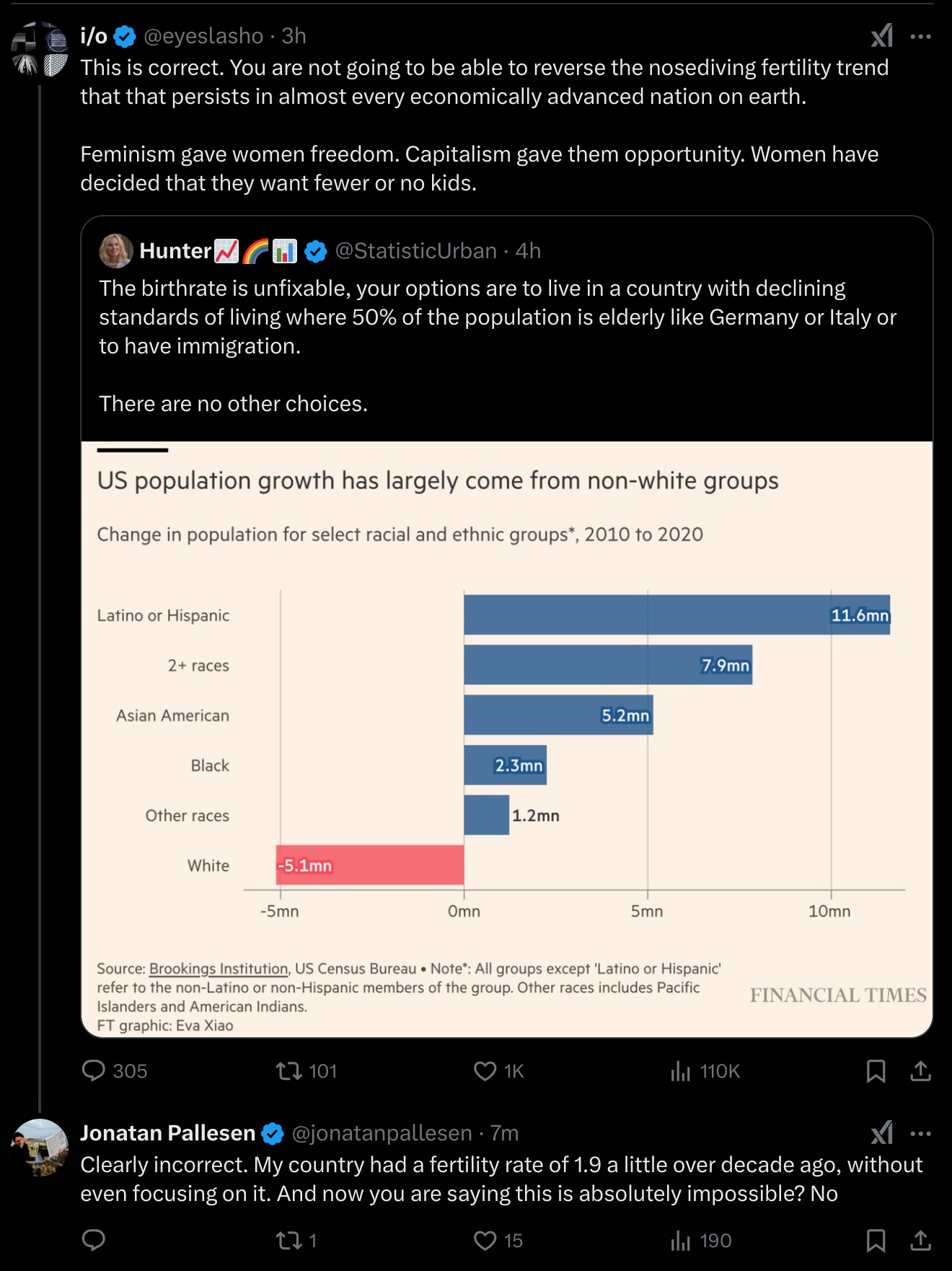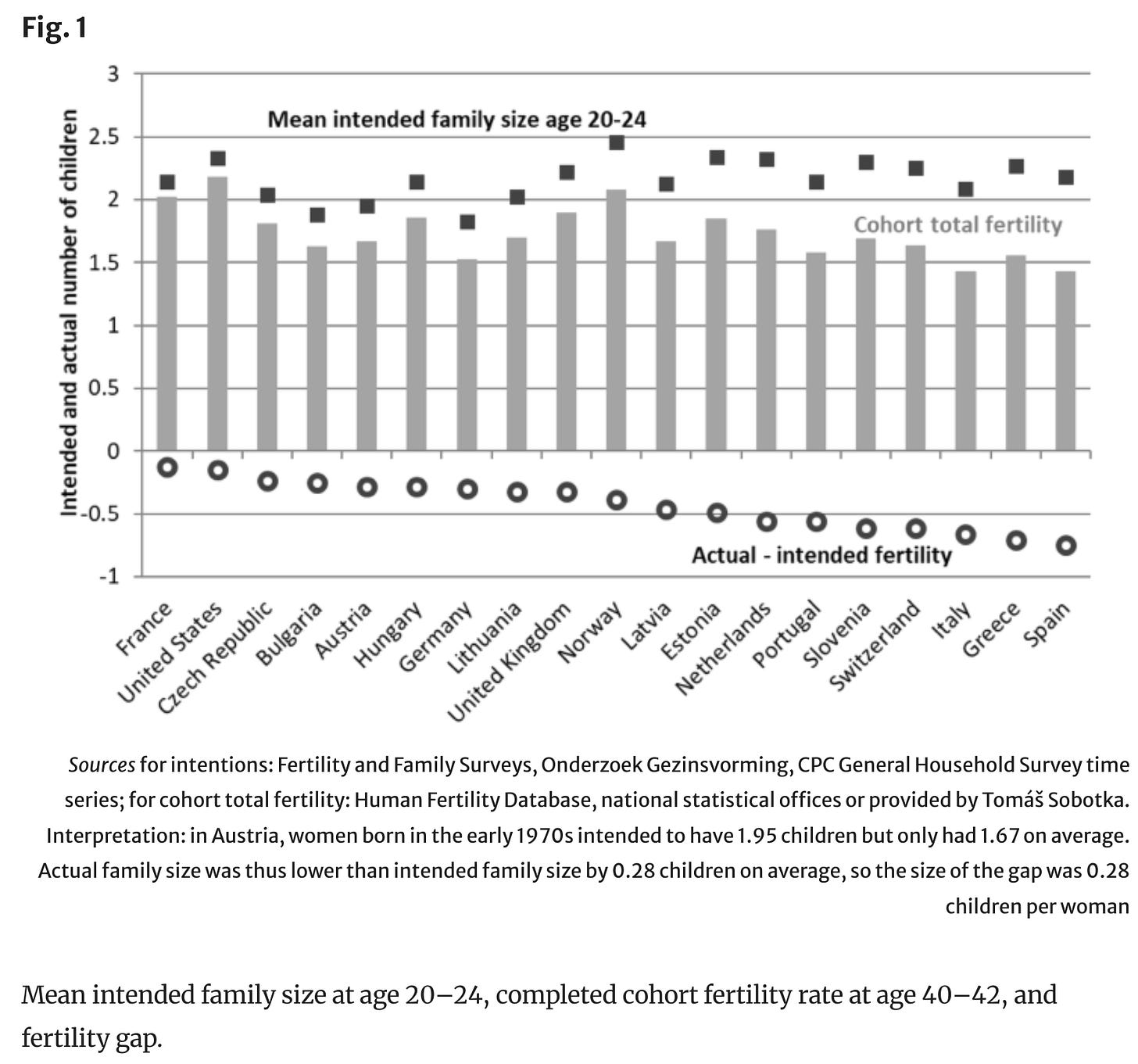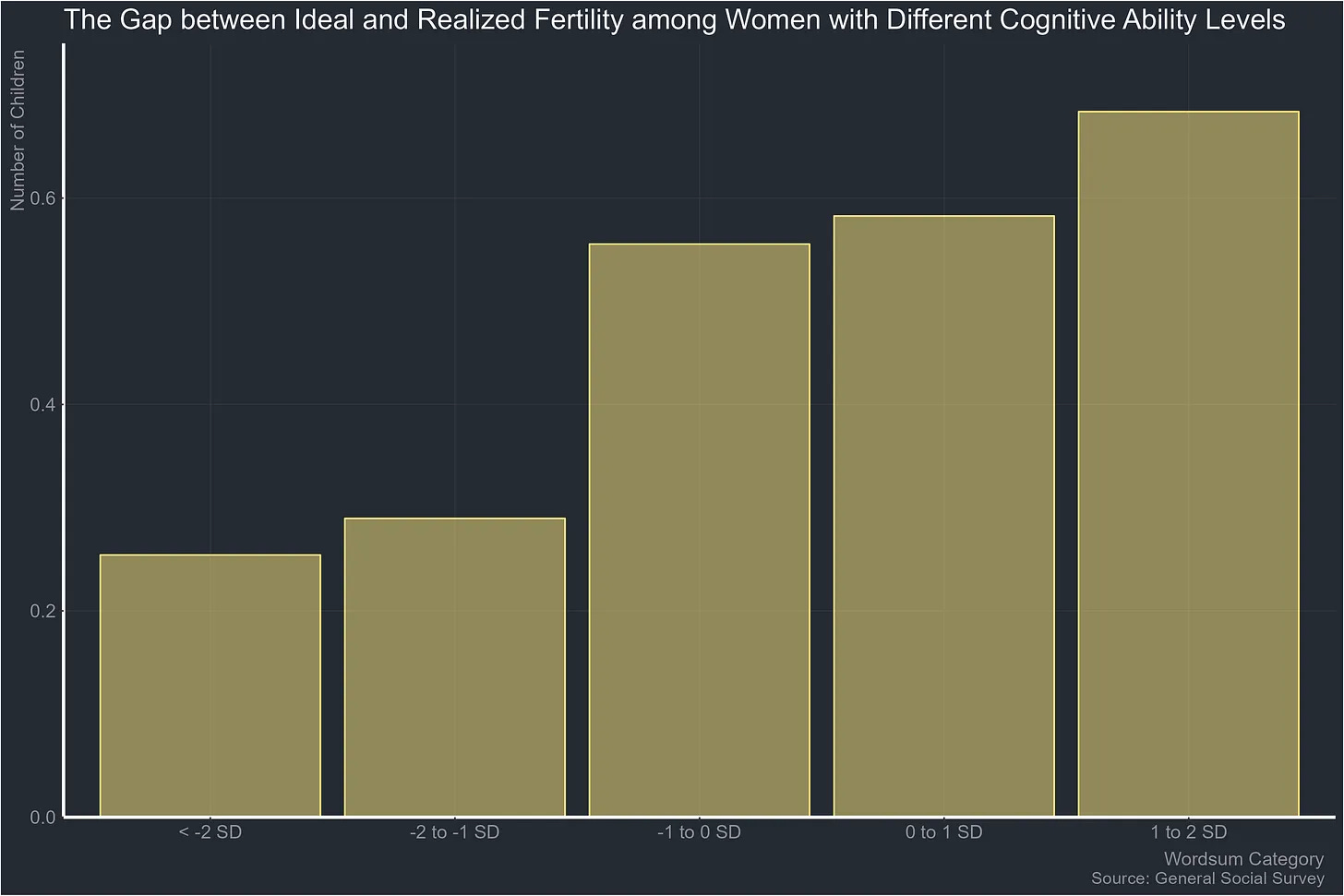Give women what they want: more babies
Make parenthood great again
Central to the decline of the West and now almost all high income countries is that they have too low fertility. Just a reminder from the prior post:
Why the decline? Well, one could say that women have just moved on from the mother role and now find working 40 hours a week and scrolling Instagram more fulfilling:
It is, however, not actually true. Rather, there is a gap between what women want and what they get in terms of fertility:
Similarly, we can ask about how many want to remain childless and how many do:
About 5% of women intended to be childless, but about 15% of them ended up without children. A travesty. There's a human capital angle to this as well:
Grouping women into 3 groups by education attained, we see that on average women in all categories in almost all countries wish for 2+ children, enough to keep the population from collapsing. However, the more educated women -- those with more money, more stable marriages, larger houses -- obtain relatively fewer than desired. They did also generally desire slightly fewer, but this is not the main driver of this dysgenic pattern, but rather their inability to get what they want. We can also re-do this using actual intelligence data (USA, 10-item vocabulary test):
The higher IQ, the larger the gap between desired and realized fertility.
Another way to approach the question is to check whether at end of their reproductive lifespans, parents are happy with the number of children they had (US data 2013):
So, of those who had no children at age 45, 56% wish they had more. Of those with children, only 7% wish they had none. There's also a UK replication from 2021:
So of all parents, only 8% wish they had fewer or none at all, while 29% wish they had more. Conversely:
Of those with children, only 1% regret it to a great extent, and in total only 8% to some extent. This is much smaller and less serious than the regret of not having enough. The verdict is clear: what women want is to have more children than they have. We need to change society so this happens, at almost any cost.
If you are into economics, I know what you are thinking. Their revealed preferences show they don't really want more children. But not really, because this assumes humans can perfectly optimize for all of their preferences simultaneously and are equally successful in fulfilling them. We have seen that fertility rates are plummeting, but not because of a lack of desire on women's part. Society is increasingly preventing them in some way or another, making it relatively harder compared to other goals, or introducing too many distractors. This is not something that's impossible to fix. We aren't even trying much despite human civilization depending on this. This is crazy.
One of the main problems is the conflict in time use with careerism. Women spend more time on education than men. This is probably an effect of their higher conscientiousness and desire to follow the path that society tells them to follow: get a degree, become self-sufficient in your career, then maybe find a husband at age 30. This default life playbook needs to be geared more towards marriage and motherhood. Shorter education, less worry about being self-sustainable. Among married couples, there is no recent fertility decline.
However, the marriage % is declining. Statistically, this marriage decline explains a great deal of the fertility decline:
To be fair, one problem here is that married couples are increasingly self-selected, which makes this kind of modeling more biased, but hopefully not too much. Ignoring this issue, it seems the main thing we need to do, as a society, is to change laws and culture so to make young couples marry more and live together. Some ideas:
(Reintroduce) marital tax benefits, as a function of age (0% after 45, say).
State subsidies for rent for marriage cohabiting couples.
Earmarked housing slots for married couples in desirable locations.
Preferences for healthcare appointments for marriage couples and their children (move forward in queue).
Posters in public spaces (public transport, public buildings, waiting rooms, etc.) showing happy, married couples with children. Augment facts about regret, statistical benefits (happier, longer lived etc.). Marriage and family formation should be perceived as high status.
State media should feature advertisement for this in the same style as above.
We need more Starship Troopers attitude.














In my opinion, reducing the number of years of formal education in society would not only reduce the fertility problem, but also reduce the negative correlation between intelligence and fertility.
A large part of people, both men and women, go to university, while for the absolute majority it is useless, the reason? The intense promotion of a university degree by society/leftists as something with high prestige and essential in life, while it is not.
I read your previous post and I think artificial intelligence will help us, with the intense automation of jobs and education , people will be much less interested in going to university.
This will mean a decrease in the negative correlation between intelligence and fertility and an increase in fertility rates.
May the machine gods save us.
This is interesting and suggestive, but is it true? I would suggest that an apt comparison for the question: ‘would you like to have (more) children?’ is the question ‘would you like to exercise (more) / eat (healthier) foods?’ Also in the latter case you are likely to find a significant majority of people answering in the affirmative. However, public interventions to nudge people toward healthier lifestyle have a mixed record at best (not to mention the libertarian objections against interfering with people’s lifestyle, eg tax on sugars et similia).
Concerning the correlation between marriage s and having children, since you are very well/versed in statistics, what makes you think that there is a causation link? I am raising the questions because, like you, I think the problem is fundamental.